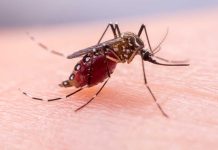
(DailyDig.com) – An Oregon citizen from Deschutes County contracted the bubonic plague, which has not been reported in the state since 2015, health authorities said.
Since the matter was detected and handled early on, officials said that the community was not in danger. The investigation into communicable illnesses has not uncovered any new instances of plague.
In a press statement dated February 7, Health Services in Deschutes County identified the resident’s ill pet cat as the most likely source of the plague infection.
County health officer Dr. Richard Fawcett stated in a press release that he has notified and provided medication to all individuals in proximity to the sick person and the cat to prevent illness.
The infection is caused by the bacteria Yersinia pestis, and the most prevalent type is medically known as bubonic plague. A parasitic infection of the infected person’s lymphatic system causes inflammation and swelling of lymph nodes, or “buboes,” which are hallmarks of this condition.
If not caught early, bubonic plague may develop into septicemic plague, an infection of the bloodstream, and pneumonic plague, an infection of the lungs, both of which are more dangerous and harder to treat.
The Oregon Health Authority reports that the state’s last recorded occurrence of plague in humans was in 2015.
Symptoms of the plague typically manifest in humans between two and eight days after exposure. Sudden development of weakness, muscular pains, fever, chills, nausea, and noticeably enlarged lymph nodes (buboes) are all possible symptoms.
Infected animals or fleas may transmit the disease to humans through contact or a bite.
Authorities in Central Oregon have reported that chipmunks and squirrels are the primary carriers of bubonic plague, although mice may also transmit the illness.
Authorities have issued a warning to the public and their pets: stay away from fleas and rodents, especially wounded, ill, or dead rats, if people worry about stopping the plague from spreading.
Antibiotics may cure the sickness if found early, but it soon becomes deadly if not.
Copyright 2024, DailyDig.com













